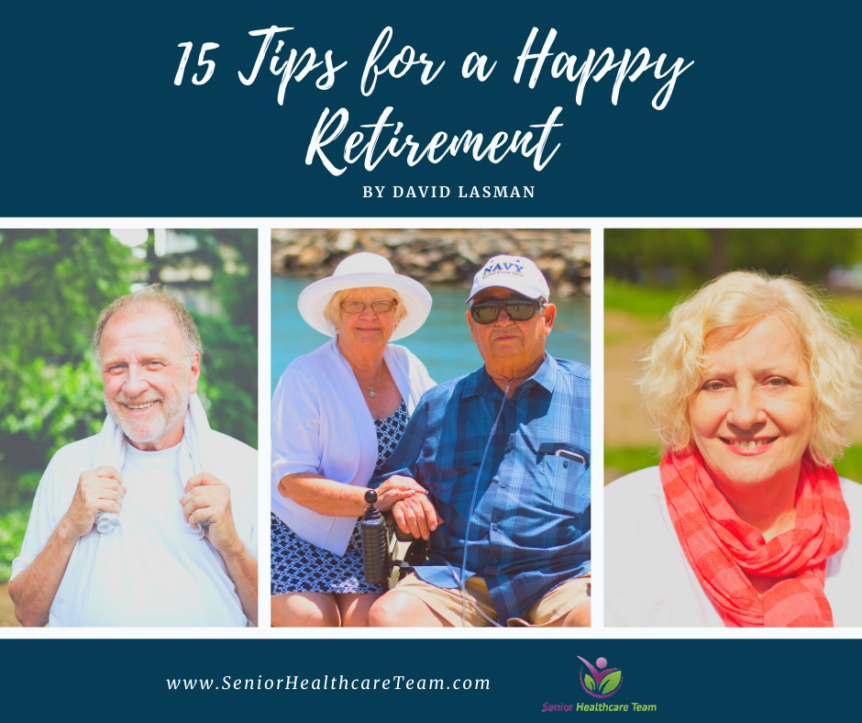Research shows that more than 50 percent of people who haven’t planned for retirement are nervous about the impending change, however 95 percent of people who have prepared are optimistic and excited about giving up work.
1. Ease yourself into retirement
A phased exit from the workforce is easier and less stressful than coming to a sudden stop because you’re giving yourself time to acclimatize.
It’s recommended that people would start to work less – perhaps go from full-time to a four-day or even a three-day week.
If you’re working flat out one day and not working the next, retirement can feel like falling off a cliff. It’s best to talk to people about preparing for this big change up to two years before they retire.
If possible, consider progressively reducing your working schedule to acclimatize to your new routine.
2. Choose the best season to leave
If you retire in spring or summer, it’s easier to be out, about and active, filling your days with enjoyable activities.
Those who retire in the spring and summer months transition more easily to retirement than those who do so in autumn and winter – people can often feel down in November and December.
3. Decide who you are now
A lot of people describe themselves by what they do rather than who they are and this can become a bit of a problem when they no longer have a job. They can become insecure, lose their self-confidence and may become depressed.
It’s important to identify your new identity. Some people recommend the creation of a list of the various identities you hold. This could read like ‘mother, tennis player, accountant, grandmother’ – where does work come on the list? Those who see themselves firstly by occupation find it most difficult to transition.
4. Tap back into old hobbies
The combination of work and commute time usually adds up to more than 50 hours a week for many people – and that’s lot of time to fill once you’ve retired.
If you don’t’ stimulate yourself mentally and or physically, you’ll ‘rust out.’ You’ll literally lose your memory and concentration and rust away mentally, emotionally and physically if you don’t have an active daily schedule. So it’s important to stay motivated and active. Consider what hobbies and activities you enjoy and potential new ones you might now have the time to engage in.
5. Be wary of developing bad habits
With no work to get up for in the morning, it’s easy to lie in bed, have that extra glass of wine or two in the evenings, or graze on food during the day. Ask yourself would I be doing this if I was in work? Is it healthy?
When we’re working we have a routine. When work isn’t there anymore we don’t have that routine so there’s a risk of increased alcohol and food consumption and more sedentary lifestyle if you don’t develop a routine in retirement.

6. Consider using your skills and expertise elsewhere
What about volunteering or mentoring? You may be the perfect choice of secretary or event planner for a local community group because you now have a lifetime’s worth of skills, expertise and competencies that could be of benefit elsewhere. It’s best to volunteer with organizations that you identify with. It might be best to be “tight” about how much time you are prepared to give initially.
Feel your way. Start small and increase the amount of time you are prepared to donate.
7. Plan your routine
Before you retire, consider what your new week or month will look like.
What time will you get up at? What daily/weekly activities will you commit to that will help you stay occupied and in a good routine?
We tend to make assumptions about what we’re going to do and our partners may make assumptions about what we will do.
Compare your idea of what you will do with your partner’s expectations about your retirement, he advises.
8. Financial planning
Research shows that 65pc of people feel finances are their greatest concern when approaching retirement, so it’s a good idea to evaluate your new income, and project what kind of outgoings you see coming down the tracks.
Remember, when you’re working you’re not in the way of spending and when you’re not working money can leak away. Budgeting a certain amount of miscellaneous spend per week or month. Knowing in advance what your monthly budget looks like can take a lot of the stress out of retirement.
9. Travel
Possibly for the first time in decades you may now have the time to take extended long-haul holidays at home or abroad. It’s important to realize that the older you get, the more difficult it can be to manage those debilitating long journeys.
Crossing time zones can take a lot out of people, therefore, it’s not a good idea to postpone those desired ‘big’ trips.
Travel sooner rather than later! Waiting too long can mean you are discouraged from travelling by everything from the exhaustion involved in long-haul flights to medical conditions such as deep vein thrombosis or blood circulation issues.
10. Legal planning
Another administrative ‘must’ is dealing with legal matters. Make sure you have made a will and consider setting up Power of Attorney or an Enduring Power of Attorney in case a situation may arise in which you may not be in a position to manage your retirement. Seek advice from your solicitor. Don’t just download a will from the internet or buy a blank form in a stationery provider as this may result in problems down the road.
Take your legal planning seriously and realize that professional advice is best.
11. Resist bringing your work-self home
At the best of times, it can be hard to leave our work persona at the door.
When retired, be mindful not to be the CEO, or the accountant or the leader at home. Resist the urge to control, plan and demand reporting from those around you.
12. Grow your social network
Remember, about 80ercent of our social contacts are based in the workplace so you need to develop new social networks – particularly in relation to daytime social events to take up the time that you would have been spending at work.
Many people today work a significant commute from their own communities, so they may simply not know people who live close to them. Consider everything from Men’s Sheds to local clubs because the harsh reality is that ‘one day, one of every couple will be single’.
13. Set boundaries
There is a tendency for those around us, such as family members, to assume that once we retire, we have unlimited time to dedicate to the needs of others. There may be a certain level of presumption on behalf of family members that you may need to guard against.
14. Seek professional advice about your retirement
This is a hugely transitional period, that can be daunting for some. Agencies run regular courses with the aim of helping to set SMART goals for retirement – specific, measurable, achievable, realistic and timely. Who knows, you might even expand your social network and meet new retirees in the process!
15. Enjoy
Life expectancy continues to rise in the developed world. Average life expectancy for a male retiring at 65 is now 20 years in Ireland. For females, it’s three to four years’ longer. The probability of living to or beyond 90 is 47 percent for a man, and 55 percent for a woman.
You have worked hard professionally to this point, and perhaps raised a family in the meantime also. Now is the time to plan towards your new future with optimism by planning ‘chunks’ of time rather than writing up a detailed daily schedule.
Getting ready to enter retirement? Be sure you know when to sign up for Medicare and read this next: When do People Sign up for Medicare?
By David Lasman – “Ask Medicare Dave” | President – Senior Healthcare Team
wwww.SeniorHealthcareTeam.com | 866-333-7340 Selecting the right healthcare plan through Medicare can be overwhelming and downright stressful. Senior Healthcare Team is a nationwide resource that provides guidance and support about Medicare to seniors at no cost to them and helps them to choose the most suitable insurance plan tailored to their specific needs and budget. Our goal is to educate and empower our clients to make the best decisions regarding their healthcare and clear up the confusion of Medicare. At Senior Healthcare Team, we aren’t partial to any one insurance company. Our loyalty is to our clients and our mission is to provide them with the best healthcare options at the very lowest cost.

